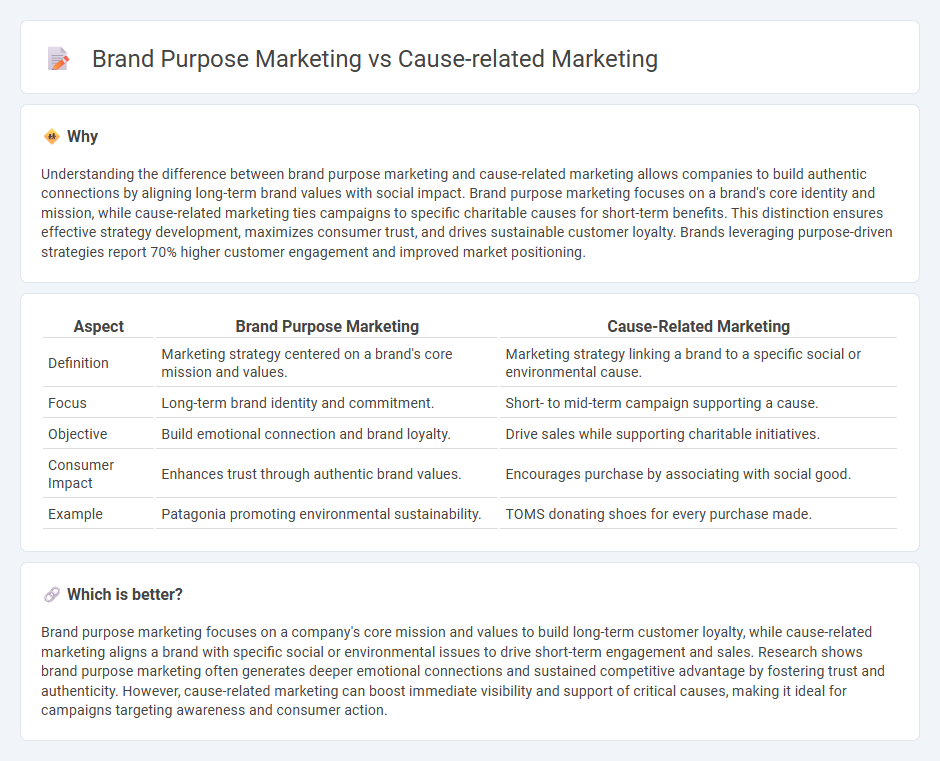
Brand purpose marketing focuses on aligning a company's core values with its business strategy to build long-term trust and loyalty among consumers. Cause-related marketing involves partnerships between businesses and charitable organizations to promote social causes while driving sales and brand awareness. Explore how integrating these approaches can enhance your marketing effectiveness and social impact.
Why it is important
Understanding the difference between brand purpose marketing and cause-related marketing allows companies to build authentic connections by aligning long-term brand values with social impact. Brand purpose marketing focuses on a brand's core identity and mission, while cause-related marketing ties campaigns to specific charitable causes for short-term benefits. This distinction ensures effective strategy development, maximizes consumer trust, and drives sustainable customer loyalty. Brands leveraging purpose-driven strategies report 70% higher customer engagement and improved market positioning.
Comparison Table
| Aspect | Brand Purpose Marketing | Cause-Related Marketing |
|---|---|---|
| Definition | Marketing strategy centered on a brand's core mission and values. | Marketing strategy linking a brand to a specific social or environmental cause. |
| Focus | Long-term brand identity and commitment. | Short- to mid-term campaign supporting a cause. |
| Objective | Build emotional connection and brand loyalty. | Drive sales while supporting charitable initiatives. |
| Consumer Impact | Enhances trust through authentic brand values. | Encourages purchase by associating with social good. |
| Example | Patagonia promoting environmental sustainability. | TOMS donating shoes for every purchase made. |
Which is better?
Brand purpose marketing focuses on a company's core mission and values to build long-term customer loyalty, while cause-related marketing aligns a brand with specific social or environmental issues to drive short-term engagement and sales. Research shows brand purpose marketing often generates deeper emotional connections and sustained competitive advantage by fostering trust and authenticity. However, cause-related marketing can boost immediate visibility and support of critical causes, making it ideal for campaigns targeting awareness and consumer action.
Connection
Brand purpose marketing and cause-related marketing are connected through their shared focus on aligning a company's mission with social or environmental values to foster deeper consumer engagement. Both strategies drive brand loyalty by demonstrating commitment to causes that resonate with target audiences, enhancing emotional connections and trust. Leveraging authentic storytelling around brand purpose and social impact initiatives maximizes marketing effectiveness and strengthens overall brand equity.
Key Terms
Cause-related marketing:
Cause-related marketing directly aligns a company's products or services with a specific social or environmental cause, leveraging consumer purchases to generate both revenue and positive impact. This strategy enhances brand image by associating commercial activities with meaningful issues, often resulting in increased customer loyalty and market differentiation. Explore how cause-related marketing drives authentic engagement and measurable social benefits.
Partnerships
Cause-related marketing centers on specific partnerships between brands and nonprofits to drive sales while supporting social causes, often through campaigns tied to donation commitments. Brand purpose marketing goes deeper by integrating a brand's core values into long-term efforts that foster sustainable partnerships and authentic social impact. Explore how aligning brand partnerships with purpose enhances credibility and consumer trust.
Fundraising
Cause-related marketing centers on partnerships between brands and nonprofits to drive specific fundraising campaigns, often tied to short-term goals and sales promotions. Brand purpose marketing aims to embed social or environmental missions into the core identity of a company, fostering long-term engagement and consistent support for causes. Explore how these strategies differ in impact and effectiveness in fundraising efforts.
Source and External Links
What is Cause Marketing? | University of Phoenix - Cause marketing, also known as cause-related marketing, is a strategic partnership between businesses and nonprofit organizations that benefits both by increasing brand awareness, supporting social causes, and engaging the public positively.
What is Cause Marketing? | Mailchimp - Cause marketing involves collaboration between for-profit businesses and nonprofits to boost social responsibility, enhance corporate reputation, and increase awareness for causes important to consumers.
Cause marketing - Wikipedia - Cause marketing is marketing by for-profit businesses aimed at increasing profits while bettering society, showing significant growth and strong consumer preference for socially responsible brands.
 dowidth.com
dowidth.com